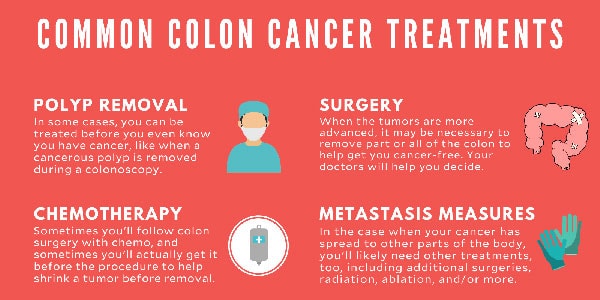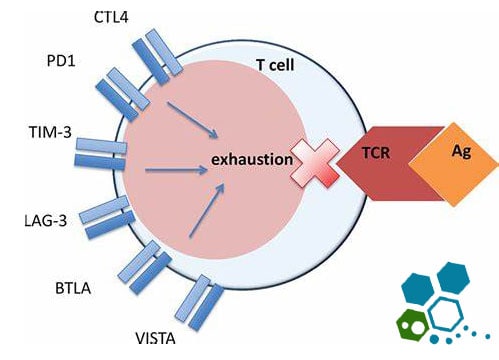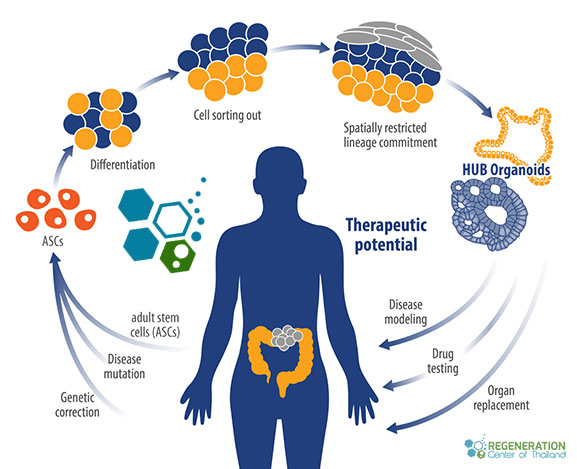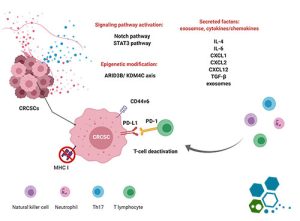Colorectal cancer also known as rectal cancer or bowel cancer occurs when abnormal cells grow out of control in the large intestine or rectum and form malignant tumours. Most colorectal cancers arise in the lining of the colon and rectum and form malignant tumors from benign polyps through different genetic mutations. Polyps are benign growths that are usually harmless. However, if it’s not detected and undiagnosed for a long time, it may become malignant.
What is Colorectal cancer?
Colorectal cancer includes a colon or rectal cancer, depending on the location and origin of the cancerous tumours. Colorectal cancera is one of the most common types of cancer in the world and the second leading cancer killer.
Is Bowel cancer hereditary?
Nearly one-third of all colorectal cancers are believed to be caused by genetics and family history. The three most common genetic disorders associated with colorectal cancer are:
- MYH gene mutation associated polyposis – is caused by mutations in the MYH gene, resulting in the appearance of 10-100 more colorectal cancer polyps, which then become malignant tumors.
- Familial adenomatous polyposis (FAP) – Causes a large number (100–1000) of adenomatous polyposis, gland-like growths in the lining of colorectal cancer.
- Hereditary Non-Polyposis Colorectal Cancer (HNPCC ) (Lynch Syndrome) – Causes a mutation in a gene responsible for protecting cells from abnormal growth and transformation into cancer cells.

Staging of Colorectal Cancer
Colorectal cancer is staged and classified using the TNM system, which helps doctors understand your cancer.[1] TNM is:
- Tumour: The extent to which a tumour affects the wall of the bowel or other tissues, for example, whether it has passed through the wall of the rectum or colon.
- Nodes: If nearby lymph nodes are affected.
- Metastasis: The overall extent to which cancer has spread to other organs in the body.
- Colorectal cancer is classified into five stages (stages 0 to 4).
Signs and symptoms of colorectal cancer
Not everyone will experience symptoms of colorectal cancer. However, some common symptoms include:
- Changes in bowel habits
- Sudden weight loss
- Lump or pain around the anus
- Diarrhoea, constipation, loose stools, or mucus
- Stool with bright red or dark red blood
- Frequent tiredness and shortness of breath
- Unexplained anaemia (low iron)
- Abdominal discomfort or bloating

Diagnosing Colorectal cancer
Regular cancer screenings are essential for the early detection of bowel cancer in people with no signs or symptoms. The Regeneration Center recommends annual cancer screenings for all persons aged 48 to 80. Tests should include faecal occult blood tests to detect any blood particles (a potential symptom of colorectal cancer) in the stool.
For patients who have bowel cancer symptoms or are not fully diagnosed yet a comprehensive colorectal cancer screening will be necessary and can be done in Bangkok or outside of Thailand.
Standard bowel cancer tests include:
Colonoscopy: A colonoscopy exam is a procedure in which a tube with a camera attached to the rectum is inserted into the rectum to examine the entire length of the colon. Colonoscopy is most commonly used to diagnose severe iron deficiency anaemia and patients with mild bowel symptoms. This test has both diagnostic and therapeutic uses. It can take tumour biopsies, stop tumour bleeding, and place stents to relieve blockages.
CT Scan or Computed Tomography Colonography – Computed Tomography Colonography, also known as virtual colonoscopy. It provides a less invasive examination for those who cannot undergo colonoscopy by utilizing 3D images of the large intestine and rectum produced by a computed tomography scanner. However, colonoscopy tests may still be required if a biopsy is required. If the CT Scan results lead to a diagnosis of ulcerative colitis or bowel cancer, additional tests are usually done to assess whether cancer has spread beyond the colon or rectum.[3]
Other checks can include:
- Stool DNA Test
- Fecal occult blood test (FOBT)
- Fecal immunochemical test (FIT)
- Magnetic Resonance ( MRI scan )
- Positron scanning
- Blood tests
- Genetic cancer screening
Treatment of Colorectal Cancer (Non-Metastatic)
There are many treatments available for colorectal cancer, and our treatment plans are customized to you and your cancer. Immunotherapy treatment options for colorectal cancer depend on the cancer type, tumour size, stage, location, health, and treatment preferences. One of the most common traditional treatment for colorectal cancer is surgery, depending on the cancer stage. It can be used with chemotherapy, radiation therapy or targeted therapy.
Traditional Treatments for Rectal Cancer
Cancer Surgery – A surgical procedure can be used to treat colorectal cancer is known as a colorectal resection (colectomy). Colon resection surgery requires removal of all or  part of the colon.
part of the colon.
Two techniques for colectomy surgery include:
- Laparotomy – a surgeon will make a large incision in the abdominal wall to remove part of the colon
- Laparoscopic surgery – a less invasive type of colectomy surgery that only requires 4 to 5 small incisions to cut through the colon
Although both techniques effectively remove tumours, laparoscopic surgery is now the routine technique for colorectal resection. It reduces bleeding, postoperative pain and wound infection and allows for faster recovery of bowel and body function after surgery and shorter hospital stays [4].
Other treatments include:
- Radiation therapy – using radiation to target and destroy cancer cells
- Chemotherapy – the use of drugs to kill cancer cells
- Targeted therapy – a therapy designed to destroy cancer cells while leaving healthy cells intact
Functional Oncology for Treating Bowel Cancer
 The Regeneration center oncology team take a unique biological-based intervention for the treatment prostate and colorectal cancer. Immunotherapies have shown significant advantages when combined with cellular therapies in both early and advanced cases of this disease.
The Regeneration center oncology team take a unique biological-based intervention for the treatment prostate and colorectal cancer. Immunotherapies have shown significant advantages when combined with cellular therapies in both early and advanced cases of this disease.
Our integrative approach to dealing with cancers uses a variety of techniques alone or as Adjuvant immunotherapies including:
- Monoclonal antibodies – mAbs
- Cytokines – Interleukin, interferon, and growth factors
- CAR T-cell therapy for colorectal cancer and peritoneal mesothelioma treatment
- Oncolytic virus Therapy to target infects and natural killer cells
- Adoptive cell transfers or Adoptive immunotherapy [2]
- High-Intensity Focused Ultrasounds or HIFU
- Stem Cell Therapy
- Metronomic chemotherapy
- Photodynamic Cancer Therapy
- Internal Radiation Therapy to check for bone marrow cancer
- Therapeutic Dendritic cell vaccines – Leukocytes that present Antigens to T cells
- Cyberknife and Cryosurgery
- Immune modulation & Checkpoint inhibitors – T-cell receptors producing an antitumor immune response
Immunotherapy for Colorectal Cancer
Our team of cellular oncologist have over 50 years of experience dealing with cancers and the immune system. The holistic cancer treatment and NK cell protocols we provide offer unique bio- engineered approach without the need of invasive surgeries or dangerous toxic side effects. The Regeneration Center protocol for cancer is an integrative and targeted approach to attack the existing tumors, alleviate the underlying symptoms and significantly increase the overall quality of life for any patient diagnosed with the destructive effects of the disease. With or without conventional therapies, With or without metastasis our cancer remediation programs offers patients the highest chances for success.[5]
engineered approach without the need of invasive surgeries or dangerous toxic side effects. The Regeneration Center protocol for cancer is an integrative and targeted approach to attack the existing tumors, alleviate the underlying symptoms and significantly increase the overall quality of life for any patient diagnosed with the destructive effects of the disease. With or without conventional therapies, With or without metastasis our cancer remediation programs offers patients the highest chances for success.[5]
Traditional cancer treatments such as chemotherapy & radiation therapy expose humans to significant side effects and toxicity. Over time, the traditional methods have not changed but the cancer cells themselves have evolved making them more resistant to the chemicals and rendering these traditional therapies ineffective especially in later stages of kidney cancer, lung cancer, prostate cancer pancreatic adenocarcinoma and hepatocellular carcinoma. This evolution of cancer stem cells is what leads to recurrence and allows them to proliferate much more aggressively than before the chemo & radiation therapies began decades ago. Some new pharmaceutical based medications have been developed to effectively target and destroy cancer cells with much less toxicity, but the payloads often don’t reach the intended destinations and are consumed but the patients immune system before it can reach the intended targets and tumors.
T-Cells attacking Colorectal cancer cells
Stem Cell Therapy for Colorectal Cancer
A tightly integrated approach in the treatment of bowel cancer, our cancer stem cell treatments continue to improve remission rates year after year. With new discoveries in pancreatic cancer research, clinical trials for new protocols to more effectively treat stage 1 – stage 4 colorectal cancer. The Regen Center is a pioneer in regenerative medicine and are able to apply new bioengineering techniques to better manage malignant tumors and to help our patients live a cancer-free life, with minimal toxicity and without fear of remission.
To determine eligibility and treatment opinions from our immunotherapy team we will need to better understand the patient’s existing needs via recent histological results, Biopsy scans, blood tests, x-rays, scans, bone marrow sample results and/or clinical diagnosis documents from your primary care oncologist.
Being diagnosed with the big “C” does not have to be the last stand. Even if traditional cancer treatments options have reached their limits, Our team can still offer options that bring you one step closer to the latest treatment for rectal cancer and living a cancer-free life. We are here to help you and your family get past the disease using safe and research-based alternative treatment options for treating cancer of the bowel. To learn more please contact us today.
Published Clinical Citations
[1] ^Siripongpreeda B, Mahidol C, Dusitanond N, Sriprayoon T, Muyphuag B, Sricharunrat T, Teerayatanakul N, Chaiwong W, Worasawate W, Sattayarungsee P, Sangthongdee J, Prarom J, Sornsamdang G, Soonklang K, Wittayasak K, Auewarakul CU. High prevalence of advanced colorectal neoplasia in the Thai population: a prospective screening colonoscopy of 1,404 cases. BMC Gastroenterol. 2016 Aug 23;16(1):101. doi: 10.1186/s12876-016-0526-0. PMID: 27553627; PMCID: PMC4995664.
[2] ^Fan J, Shang D, Han B, Song J, Chen H, Yang JM. Adoptive Cell Transfer: Is it a Promising Immunotherapy for Colorectal Cancer? Theranostics. 2018 Nov 10;8(20):5784-5800. doi: 10.7150/thno.29035. PMID: 30555581; PMCID: PMC6276301.
[3] ^Alsadhan N, Almaiman A, Pujades-Rodriguez M, Brennan C, Shuweihdi F, Alhurishi SA, West RM. A systematic review of methods to estimate colorectal cancer incidence using population-based cancer registries. BMC Med Res Methodol. 2022 May 19;22(1):144. doi: 10.1186/s12874-022-01632-7. PMID: 35590277; PMCID: PMC9118801.
[4] ^Du W, Frankel TL, Green M, Zou W. IFNγ signaling integrity in colorectal cancer immunity and immunotherapy. Cell Mol Immunol. 2022 Jan;19(1):23-32. doi: 10.1038/s41423-021-00735-3. Epub 2021 Aug 12. PMID: 34385592; PMCID: PMC8752802.
[5] ^Silva VR, Santos LS, Dias RB, Quadros CA, Bezerra DP. Emerging agents that target signaling pathways to eradicate colorectal cancer stem cells. Cancer Commun (Lond). 2021 Dec;41(12):1275-1313. doi: 10.1002/cac2.12235. Epub 2021 Nov 17. PMID: 34791817; PMCID: PMC8696218.

